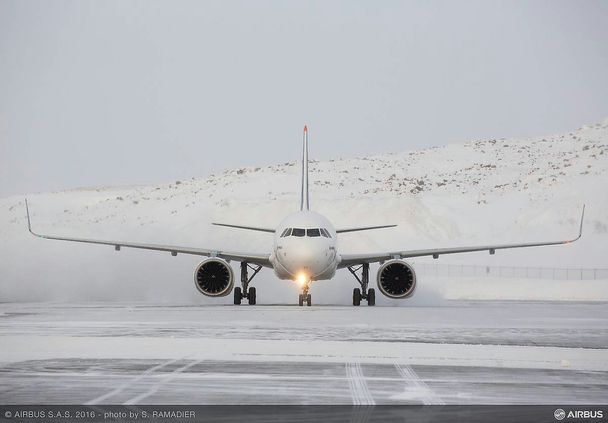NAVBLUE launches RunwaySense, a new service enabling airlines and airports to assess and report runway conditions using the aircraft as a sensor

Toulouse, France, 16th July 2020
- Unique solution to help airports meet TALPA and GRF requirements, enhancing landing safety
- Based on NAVBLUE’s BACF+ software transforming aircraft into a sensor
- More than 10 airlines have signed up, representing more than 880 aircraft
NAVBLUE is pleased to announce the launch of the RunwaySense service, allowing airlines and airports to accurately assess and report runway conditions by using Airbus aircraft as a sensor.
Airports can use the aircraft data to inform their runway clearing operations, better timing runway clearing activities or targeting application of de-icing chemicals. Furthermore, with the mandatory ICAO Global Reporting Format (GRF), due to come into effect in November 2020, this data contributes to airports reporting requirements with accurate, near real-time runway performance information.
Airlines can use this data to better monitor their operations as they share the data their aircraft have generated internally, or access data generated by other operators.
RunwaySense is based on BACF+ (Braking Action Computation Function), software released by NAVBLUE in 2019 on the Airbus single-aisle family. BACF+ generates a message on the aircraft accurately reporting the condition of the runway it’s just landed on, against the FAA’s Take-off and Landing Performance Assessment (TALPA) Runway Condition Assessment Matrix (RCAM). This data, already available to the pilot through the MCDU (Multi Function Control and Display Unit), will now be accessible from NAVBLUE via dedicated channels which can be selected to best fit the user’s operational requirements.
Users will be able to access the data via a NAVBLUE web-based tool or an Application Programming Interface (API) allowing them to integrate the data feed into their existing software platforms.
“RunwaySense is a truly unique solution – the only one using actual aircraft performance information to assess the runway conditions,” said Thomas Lagaillarde, NAVBLUE VP Programmes / Portfolio. “By transforming the aircraft into a sensor we’re maximising the airports' knowledge of their runway performance and therefore increasing safety for aircraft and airports. More than 10 airlines, in Europe, the Americas, Asia Pacific and Africa, have signed up for BACF+ and the number of aircraft transmitting data continues to grow. We believe the community model of sharing data is the right direction of travel for all aviation stakeholders: airlines, airports and crucially the passenger will benefit from this new technology.”
RunwaySense is the first of NAVBLUE’s airport-focussed solutions to be launched and will be followed in the coming months by AirportCore, a web platform leveraging big data to help airports better anticipate delays and congestion.